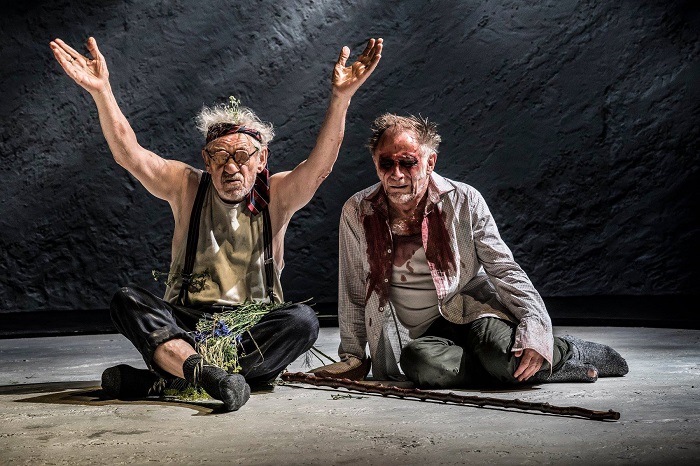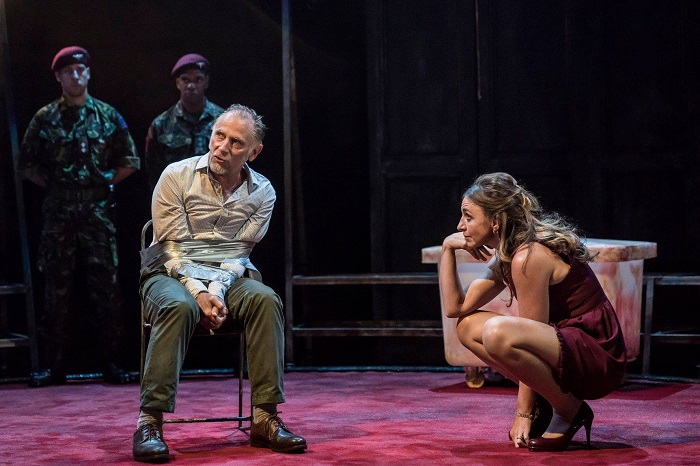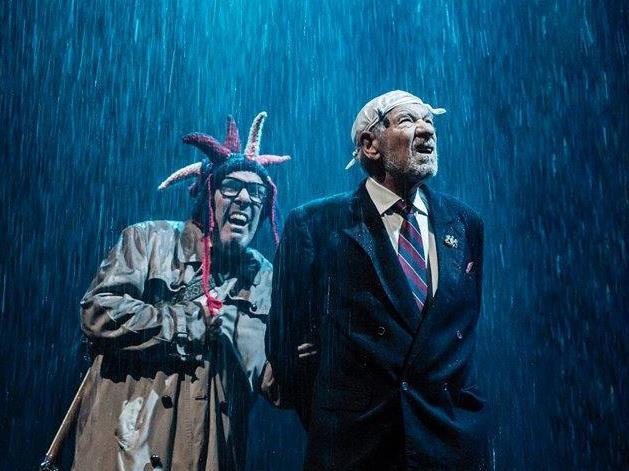Ian McKellen leads the cast in King Lear filmed at at the Duke of York’s Theatre. Photo by Johan Persson.
National Theatre Live brings us King Lear, a production from the Chichester Festival Theatre performed at the Duke of York’s Theatre in London, directed by Jonathon Danby. It’s a production you won’t want to miss.
The opening set is overshadowed by a gigantic portrait of the King. The trappings of power and authority are magnified in a prolonged introduction where Lear’s arrival is heralded by a hymn-like anthem. This creates an atmosphere of ritualistic quasi-paganism with a nod to the gestures of Nazism. Lear as god-king. The hyper-formality is immediately undercut by Lear’s cavalier behavior, cutting up a map of Britain with scissors and going through formalities with complete confidence of the outcome; hubris and his sense of entitlement, however, will instantly bring him down.
In the acconpanying interview McKellan talks about infusing this final Lear of his with a sense of intimacy, about wanting the audience feeling like they’re being spoken to directly by the king. Director Jonathan Danby has emphasised the personalities and individual struggles of the characters without losing any of the dramatic scope of one of Shakespeare’s hugest plays. King Lear is ever relevant to politics of the present day and contemporary power shifts, chillingly so right now, but Danby’s production gives weight to the human stories.
Danby brings out differences between Lear’s two older daughters, something the text doesn’t provide. On one hand we have the older sister, Goneril (Claire Price), a god-daughter of Thatcher with her resolve, Chanel suit and pearls. Her comportment and control visibly unravel in response to the bad boy appeal of Edmund (James Corrigan).

King Lear filmed at at the Duke of York’s Theatre. Photo by Johan Persson.
In contrast we have the feral, destructive energy of Regan (Kirsty Bushell), her character compellingly defined by a psychotic sexuality and bloodlust. Bushell’s walking a tight-rope here but it works. She steals the show at times. Paradoxically, perhaps, her sky-high heels help keep her singular performance of madness sufficiently in check. Alongside her gleefully manipulative murderousness, Regan inhabits a girlishness which shifts after she’s widowed. We notice the small symbolism of her appearing in trousers following the scene where Cornwall is killed. The tension of Regan’s sexuality deepens into ambition and rivalry with Goneril for the affections of Edmund. Cordelia (Anita-Joy Uwajeh) is played straight as an arrow, an upright warrior princess informed by strength rather than by traditional feminine virtue alone.
Edgar/Tom (Luke Thompson), is given an individual blitheness to his character, again, which is not offered in the text. We’re given to understand that homophobia informs Gloucester’s rejection of his legitimate son Edgar. The stage in this Lear is full of sex, expressed overtly or manifested by homo-erotic undercurrents.The male beauty of Edgar/Tom is presented as elevated, his dancer’s body a pure Grecian ideal compared to the elemental sexiness of both his half-brother Edmund and Regan’s husband, the Duke of Cornwall (Daniel Rabin). The latter is contrasted as a certain masculine type against Albany (Anthony Howell).
Sinead Cusack stands out as the steadfast Kent; her character’s sexuality subsumed into devotion. Lloyd Hutchinson’s Fool is the prototype of the familiar, camp, middle-aged duffer from British TV.
The production doesn’t shy away from the horror of the scene where Gloucester (Danny Webb) is mutilated, setting this gruesome, challenging episode in an abattoir. Another stand-out moment is the fight scene between Edmund and Albany, a beautiful choreography. Battles are depicted in stylised battle scenes with music and strobe lighting, and the soldiers in modern battle fatigues.

King Lear filmed at at the Duke of York’s Theatre. Photo by Johan Persson.
McKellan physicalises Lear’s decline, with snuffles and lapses, coughs and stumbles. Lear’s broken. But his personality and humour break through at odd moments, giving way to absent-mindedness. A scene with Lear and Tom involves a prolonged hug, as though Lear is trying to absorb Tom’s youth. Lear melts into Tom – an embrace of love and pain which flows back and forth between them, creating apologies by proxy: Lear’s silent apology to Cordelia including the grief of Gloucester (Danny Webb) in having betrayed Edgar.
McKellan is the same age as Lear: an old man perfectly acting an old man, which makes his strength in the final scene so startling and poignant. The range of spirit he gives his performance throughout, and particularly during his last moments, is incomparable. McKellan says he won’t be performing another large Shakespearean role on stage. What a note to finish on.
5 stars ★★★★★
King Lear
by William Shakespeare
National Theatre Live
Presented by Sharmill Films
Ian McKellen leads the cast of the five-star Chichester Festival Theatre production





